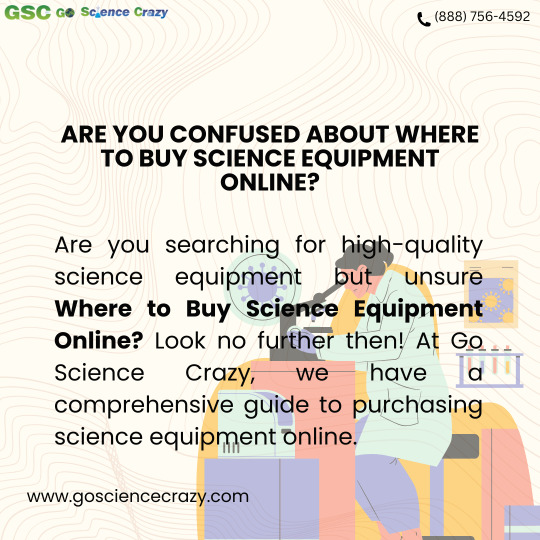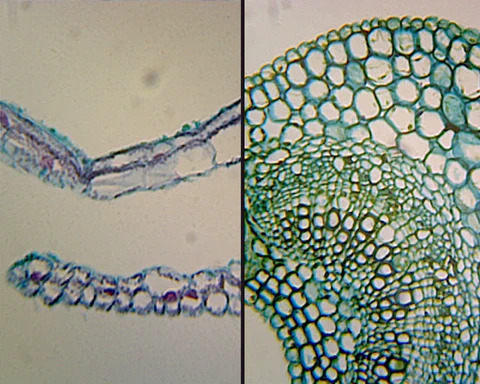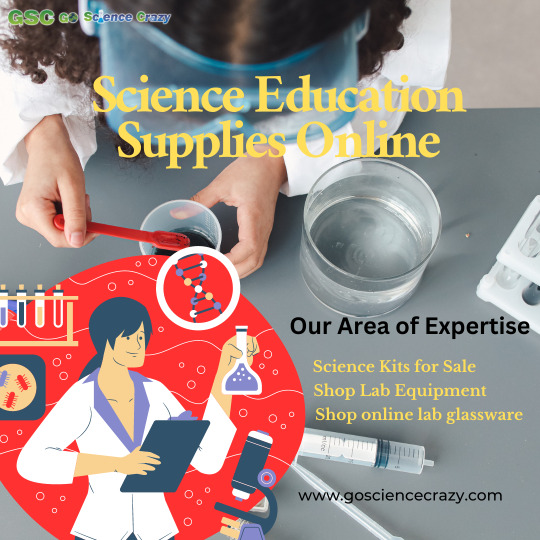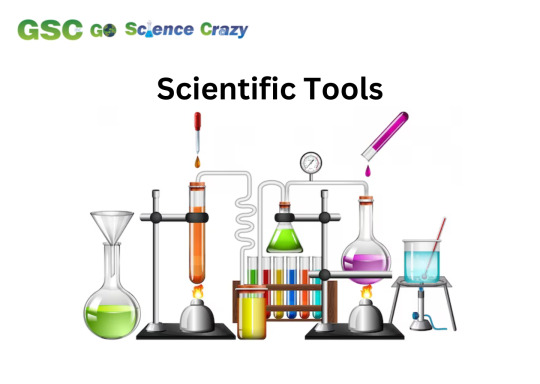Go Science Crazy is your one-stop shop for high-quality prepared microscope slides, perfect for igniting curiosity and fueling a passion for science in learners of all ages. Whether you're a homeschool parent, a teacher, or simply a lifelong learner, Go Science Crazy's extensive collection of slides offers a fascinating window into the hidden world of the microscopic. visit us: https://gosciencecrazy.com
Don't wanna be here? Send us removal request.
Text
Trusted Tools for Scientific Exploration Shop Lab Equipment at Go Science Crazy
Go Science Crazy offers a wide selection of lab equipment perfect for both classrooms and professional labs. Whether you need microscopes, beakers, or other essential tools, we provide durable, high-quality products that make scientific experiments easier and more engaging. Shop with us for affordable, reliable lab supplies to enhance your science experience
0 notes
Text

Are You Confused About Where to Buy Science Equipment Online?
Are you searching for high-quality science equipment but unsure Where to Buy Science Equipment Online? Please don't hesitate to look for any further! At Go Science Crazy, we have a comprehensive guide to purchasing science equipment online.
0 notes
Text
Shop Chemistry Supplies for Students: Essential Tools for Academic Success

Chemistry is a fundamental subject that forms the backbone of scientific understanding and innovation. Whether students are just starting to explore the basics or diving into advanced topics, having the right chemistry supplies is crucial for their success. Shop Chemistry supplies for students At Go Science Crazy, we understand the importance of quality tools and materials for educational achievement. In this article, we will explore the essential chemistry supplies that every student should have and how to choose the best options to enhance learning.
1. Essential Chemistry Lab Equipment
When it comes to chemistry, having the proper lab equipment is vital for conducting experiments safely and effectively. Here are some essential items every student should have:
Beakers and Flasks: These are used for mixing, heating, and storing liquids. Graduated beakers are especially useful for measuring liquids accurately. Erlenmeyer flasks, with their narrow necks, help in swirling solutions without spillage.
Pipettes and Burettes: Precision is key in chemistry. Pipettes are used for transferring small volumes of liquid, while burettes are essential for titrations, allowing for the precise addition of solutions.
Test Tubes: Versatile and durable, test tubes are ideal for conducting small-scale reactions and observing changes. They come in various sizes and are often used in conjunction with a test tube rack.
Bunsen Burners: Used for heating substances, Bunsen burners are a staple in chemistry labs. They provide a controlled flame that can be adjusted for various heating needs.
Safety Equipment: Safety goggles, gloves, and lab coats are non-negotiable in any chemistry lab. They protect students from harmful chemicals and accidental spills, ensuring a safe learning environment.
2. Chemicals and Reagents
Having a well-stocked inventory of chemicals and reagents is crucial for performing a variety of experiments. Some common chemicals and reagents include:
Acids and Bases: Solutions like hydrochloric acid, sulfuric acid, sodium hydroxide, and acetic acid are frequently used in chemical reactions and titrations.
Indicators: Indicators such as phenolphthalein and litmus paper are essential for determining the pH of solutions and understanding the acidic or basic nature of substances.
Salts and Solvents: Sodium chloride, potassium permanganate, and ethanol are examples of salts and solvents used in various experiments.
It’s important for students to handle all chemicals with care and follow safety guidelines to avoid accidents and ensure accurate results.
3. Scientific Notebooks and Calculators
Proper documentation and calculations are essential for any scientific experiment. Here’s why students need these supplies:
Scientific Notebooks: A good scientific notebook helps students record their observations, procedures, and results accurately. This documentation is crucial for analyzing data and drawing conclusions.
Calculators: Chemistry often involves complex calculations, including concentration, molarity, and reaction yields. A scientific calculator with functions for these calculations can be an invaluable tool.
4. Choosing the Right Chemistry Supplies
When shopping for chemistry supplies, consider the following tips to ensure you select the best products:
Quality and Durability: Choose equipment and chemicals from reputable brands known for their quality and reliability. Durable materials will withstand frequent use and ensure consistent performance.
Safety Compliance: Ensure that all safety equipment and chemicals meet industry standards and safety regulations. Properly certified products will provide better protection and reliability.
Budget Considerations: While it’s important to invest in quality supplies, there are also budget-friendly options available. Look for suppliers that offer competitive pricing without compromising on quality.
5. Where to Shop for Chemistry Supplies
Go Science Crazy is your go-to destination for all your chemistry supply needs. Our extensive selection includes everything from basic lab equipment to advanced chemicals and safety gear. With a focus on quality and affordability, we provide students with the tools they need to excel in their chemistry studies. Explore our range of products and find the perfect supplies for your academic journey.
Conclusion
Equipping students with the right chemistry supplies is essential for fostering a productive and safe learning environment. By investing in quality lab equipment, chemicals, and safety gear, students can enhance their understanding of chemistry and achieve academic success. Visit Go Science Crazy today to shop for the best chemistry supplies and set your students up for success in their scientific endeavors.
0 notes
Text
Go Science Crazy: Explore the World with Microscope Slides Online
Explore the wonders of the microscopic world with Go Science Crazy's wide selection of microscope slides, now available online! Whether you're a student, educator, or enthusiast, our high-quality slides provide a fascinating glimpse into biology, chemistry, and more. Shop our collection of ready-to-use microscope slides online and bring your scientific curiosity to life with ease and convenience.
0 notes
Text
Explore the World of Microscopy: Buying Microscope Slides Online at GoScienceCrazy.com
This article will guide you through the various types of microscope slides available online, their uses, and tips for choosing the right slides for your applications.
#science tools#science#prepared microscope slides#microscope slides#shop online lab glassware#burette tool
0 notes
Text

Shop online lab glassware With Go Science Crazy
We understand the importance of having reliable equipment in the laboratory. That's why we provide online lab glassware with the best quality science lab equipment for professional and classroom use- Go Science Crazy
0 notes
Text
Equipping Your Curiosity: A Guide to Shopping Online for Science Equipment
the digital age has brought a wealth of online retailers offering a vast array of Shop Online for Science Equipment at your fingertips.
0 notes
Text
Equipping Your Curiosity: A Guide to Shopping Online for Science Equipment

The pursuit of scientific knowledge, whether in a professional lab or a home experiment, hinges on having the right tools. In the past, acquiring scientific equipment often meant long trips to specialized stores with limited selections. Thankfully, the digital age has brought a wealth of online retailers offering a vast array of Shopping Online for Science Equipment at your fingertips.
This guide equips you with the knowledge to navigate the exciting world of online science shopping. We'll delve into the benefits of online retailers, explore factors to consider when choosing a store, and provide tips for making informed purchases.
Advantages of Online Science Equipment Shopping
Gone are the days of scouring physical stores for specific lab equipment. Online retailers offer a multitude of advantages:
Extensive Selection: Online stores boast a wider range of products compared to brick-and-mortar stores. You'll find a broader selection of equipment for specific scientific disciplines, from basic chemistry sets to advanced research-grade instruments.
Competitive Prices: With a wider pool of competitors, online vendors often offer more competitive pricing on equipment. Price comparison tools can help you find the best deals.
Convenience: Shop from the comfort of your home or lab at any time. No need to battle traffic or limited store hours.
Detailed Product Information: Online retailers typically provide detailed product descriptions, specifications, and user manuals. This allows you to research and compare products thoroughly before making a purchase.
Customer Reviews: Read reviews from other customers to gain insights into product quality, functionality, and ease of use. This can be invaluable when selecting unfamiliar equipment.
Selecting the Right Online Science Equipment Retailer
With a plethora of online options, finding the right store is crucial. Here are some key factors to consider:
Reputation: Look for retailers with a strong reputation for quality products, reliable service, and customer satisfaction. Read online reviews from trusted sources and check for industry accreditation if applicable.
Product Selection: Ensure the store offers a broad range of equipment relevant to your scientific needs.
Pricing and Payment Options: Compare prices across different vendors and consider factors like shipping costs and return policies. Look for secure payment options and clear billing practices.
Customer Service: Choose a store with responsive and knowledgeable customer service representatives who can answer your questions and guide you through the buying process.
Essential Tips for Online Science Equipment Shopping
Now that you've chosen a reputable retailer, here are some tips to ensure a smooth and successful online shopping experience:
Know Your Needs: Before browsing, carefully consider the specific experiments or procedures you'll be performing. This will help you identify the exact equipment you require.
Check Specifications: Pay close attention to product specifications such as capacity, materials, and accuracy. Ensure the equipment is suitable for your intended purpose.
Read Reviews: Don't underestimate the value of customer reviews. Look for feedback regarding product functionality, durability, and user-friendliness.
Consider Reviews: Read reviews regarding product functionality, durability, and user-friendliness.
Compare Prices: Take advantage of price comparison tools and promotions offered by different retailers to get the best deal.
Shipping and Returns: Be mindful of shipping costs and return policies. Opt for retailers with reasonable shipping rates and clear return options.
Safety First: When purchasing chemicals and hazardous materials, always ensure the retailer adheres to proper safety regulations and provides clear handling and disposal information.
Read the Fine Print: Before finalizing your purchase, thoroughly review the product description, warranty information, and return policy.
Additional Resources for Online Science Shopping
Scientific Societies: Many scientific societies have online marketplaces or resources that connect researchers with reputable scientific equipment suppliers.
Educational Supply Companies: Companies specializing in educational supplies often offer a range of science equipment suitable for home and classroom use.
Manufacturer Websites: Visit the websites of leading science equipment manufacturers to learn more about their products and locate authorized online retailers.
By following these tips and utilizing the wealth of information available online, you can confidently and efficiently equip your scientific endeavors. Remember, online shopping allows you to explore a vast array of science equipment and find the perfect tools to ignite your curiosity and fuel your discoveries. Happy Shopping!
Source URL: https://bit.ly/45VG9se
0 notes
Text

Get Rocking! Shop Earth Science Supplies Online at Go Science Crazy
Shop Earth Science Online and unearth a world of wonder with Go Science Crazy! Explore our extensive collection of rocks, minerals, fossils, and scientific tools. Whether you're a budding geologist, a curious student, or a lifelong learner, we have everything you need to ignite your passion for Earth Science. From rock and mineral collections to cloud-forming apparatuses, uncover the secrets of our planet's fascinating history, all from the comfort of your home. Shop Earth Science Online at Go Science Crazy and embark on a scientific adventure!
Get in touch:
2076 James River Ct. Nixa, Missouri 65714 📞 (888) 756-4592 [email protected]
0 notes
Text
Unveiling the Microscopic World: A Guide to Buying Microscope Slides
By understanding the different types of microscope slides, considering your specific needs, and following these helpful tips, you can embark on your microscopic journey with confidence.
0 notes
Text
Unveiling the Microscopic World: A Guide to Buying Microscope Slides

Microscopy, the science of examining objects invisible to the naked eye, opens a portal to a hidden universe. At the heart of this exploration lie microscope slides, the tiny platforms that hold the key to unlocking the secrets of cells, tissues, and microorganisms. Whether you're a seasoned scientist, a budding student, or a curious explorer of the microcosm, understanding how to buy microscope slides is crucial for embarking on your microscopic adventure.
Unveiling the Types: Plain vs. Prepared Slides
Microscope slides come in two primary varieties: plain and prepared.
Plain Microscope Slides: These are essentially blank canvases, typically made of thin, polished glass. They are ideal for those who want to prepare their own specimens. This process involves collecting a sample, mounting it on the slide, and staining it to enhance specific features for observation. Plain slides are generally inexpensive and come in bulk quantities, making them cost-effective for high-volume projects.
Prepared Microscope Slides: These pre-made slides are a fantastic option for those who want to delve into microscopy without the hassle of sample preparation. They come with a wide range of biological specimens already mounted, stained, and labeled. Prepared slides cover a vast spectrum, from plant and animal tissues to blood cells, parasites, and even geological samples. The convenience of prepared slides makes them perfect for educational settings, demonstrations, or quick observations.
Choosing the Right Slide: A Guide for Different Needs
Selecting the ideal microscope slide depends on your specific purpose. Here's a breakdown to help you navigate the options:
Educational Use: For students or those new to microscopy, prepared slides are an excellent choice. Look for slide sets that cover a variety of biological topics relevant to your curriculum. Companies often offer pre-designed classroom sets that cater to specific age groups and educational levels.
Research Applications: Researchers typically require plain slides for their own sample preparation. The choice of slide material might vary depending on the experiment. For instance, some specialized procedures might necessitate slides pre-coated with chemicals or treated for specific properties.
Medical Diagnostics: In a clinical setting, prepared slides play a vital role in disease diagnosis. Blood smears, tissue biopsies, and other specimens are mounted and stained on slides for microscopic examination by medical professionals.
Personal Exploration: Hobbyists and citizen scientists can leverage both plain and prepared slides. Plain slides allow for exploration of personal collections like insects, leaves, or even pond water. Prepared slides, on the other hand, provide a fascinating window into various biological systems for independent study.
Also Read:
Unveiling the Wonders of Scientific Tools: A Journey Through the Modern-Day Laboratory
Unveiling the World of Scientific Tools: A Shopper's Guide to Essential Instruments
Demystifying the Quest: A Guide to Shopping for Microscope Glass Slides
Beyond the Basics: Factors to Consider When Buying Microscope Slides
Once you've determined the type of slide you need, consider these additional factors to ensure a satisfying purchase:
Slide Quality: High-quality slides should be made from clear, optically flat glass to ensure optimal image clarity. Uneven surfaces or imperfections can distort the view and hinder observation.
Slide Dimensions: Standard microscope slides are typically 75 millimeters long, 25 millimeters wide, and 1 millimeter thick. Ensure your chosen slides are compatible with your microscope stage size.
Cover Slips: These thin glass squares are placed over the specimen on the slide to protect it and improve image quality. Some prepared slides might come with pre-attached cover slips, while others may require separate purchase.
Staining Techniques: For prepared slides, consider the staining method used. Different stains highlight specific cellular components, so choose slides stained appropriately for the structures you want to observe.
Additional Tips:
Reputable Suppliers: Purchase slides from reputable scientific supply companies that guarantee quality and adhere to industry standards.
Storage Considerations: Store slides in a cool, dry place away from direct sunlight to prevent damage or fading of stains. Invest in slide boxes or trays to keep them organized and protected.
Safety Precautions: Prepared slides might contain biological materials. Always handle them with care and follow proper laboratory safety protocols, especially when dealing with potentially hazardous specimens.
By understanding the different types of microscope slides, considering your specific needs, and following these helpful tips, you can embark on your microscopic journey with confidence. Remember, these tiny platforms hold the potential to unlock a universe of wonder, revealing hidden details and igniting a passion for scientific exploration. So, grab your microscope, choose your slides, and prepare to be amazed by the invisible world that awaits!
Source URL: https://bit.ly/3xaxzJe
0 notes
Text

Go Science Crazy! Shop Online Lab Glassware for Your Experiments
Go Science Crazy: Fuel Your Scientific Curiosity with Online Lab Glassware. Calling all budding scientists and home experiment enthusiasts! Go Science Crazy is your one-stop Shop online lab glassware or everything you need to outfit your at-home laboratory. We offer a vast selection of high-quality lab glassware available for purchase online, so you can conduct your experiments from the comfort of your home!
0 notes
Text
In this article, we embark on a journey through the realm of scientific tools, exploring their significance, advancements, and the avenues they open for discovery. visit:
0 notes
Text

Spark Curiosity: Find the Perfect Science Education Supplies Online at gosciencecrazy!
Go Science Crazy provides a comprehensive selection of science education materials available online! our inventory includes diverse Science education supplies online, science kits, and laboratory apparatus to outfit your classroom or home laboratory for engaging scientific inquiry. Whether you seek microscopes and slides, kits for physical science experiments, or other scientific instruments, Go Science Crazy offers the resources to stimulate curiosity and cultivate a passion for science.
#science#science tools#Shop Lab Equipment#Shop online science equipment#Shop online lab glassware#Science Kits for Sale#microscope slides Online#microscope slides buy
0 notes
Text
Unveiling the Wonders of Scientific Tools: A Journey Through the Modern-Day Laboratory

In the vast landscape of scientific exploration, tools serve as the guiding compass, enabling researchers to delve deeper into the mysteries of the universe. From microscopes to spectrometers, each instrument plays a crucial role in unraveling the complexities of nature. In this article, we embark on a journey through the realm of scientific tools, exploring their significance, advancements, and the avenues they open for discovery.
The Evolution of Scientific Instruments From the rudimentary tools of ancient civilizations to the cutting-edge technologies of the present day, the evolution of scientific instruments mirrors humanity's relentless pursuit of knowledge. Early astronomers relied on simple devices like the astrolabe and sextant to map the heavens, laying the groundwork for future discoveries. The Renaissance era witnessed the emergence of groundbreaking inventions such as the microscope and telescope, revolutionizing our understanding of the microscopic and celestial worlds.
The Birth of Modern Laboratory Equipment The 19th and 20th centuries witnessed an explosion of innovation in scientific instrumentation. With the advent of electricity and advances in materials science, laboratories became equipped with a myriad of sophisticated tools. The centrifuge, spectrograph, and chromatograph emerged as indispensable assets, enabling researchers to analyze substances with unprecedented precision. These developments paved the way for breakthroughs in fields ranging from chemistry and biology to physics and materials science.
Key Scientific Tools and Their Applications
Microscopes: From Antonie van Leeuwenhoek's primitive lens to today's electron microscopes, these instruments have transformed our understanding of the microscopic world. They are indispensable in fields such as biology, medicine, and materials science, allowing researchers to visualize structures at the nanoscale.
Spectrometers: Spectrometers are essential for analyzing the composition and properties of substances. Whether it's identifying chemical compounds, studying the spectra of stars, or elucidating the structure of molecules, these instruments provide invaluable insights into the nature of matter.
Chromatographs: Chromatography techniques, including gas chromatography and liquid chromatography, are vital for separating and analyzing complex mixtures. They find applications in pharmaceuticals, forensics, environmental science, and more, enabling researchers to isolate and identify individual components with precision.
DNA Sequencers: The advent of DNA sequencing technologies has revolutionized genetics and molecular biology. These instruments allow researchers to decipher the genetic code with unprecedented speed and accuracy, opening new frontiers in personalized medicine, evolutionary biology, and biotechnology.
Particle Accelerators: Particle accelerators propel charged particles to high speeds, enabling scientists to study fundamental particles and simulate extreme conditions. They have led to groundbreaking discoveries in particle physics, cosmology, and materials science, shedding light on the fundamental forces that govern the universe.
Also Read: Exploring the World of Physics: A Guide to Shopping for Physics Equipment
The Future of Scientific Instrumentation As technology continues to advance at an exponential pace, the future of scientific instrumentation holds limitless possibilities. Nanotechnology promises to miniaturize instruments, opening new frontiers in portable diagnostics and personalized medicine. Artificial intelligence and machine learning are revolutionizing data analysis, enhancing the capabilities of instruments and accelerating the pace of discovery.
Conclusion:
Scientific tools are the bedrock of modern research, empowering scientists to unlock the secrets of the universe. From the humble microscope to the awe-inspiring particle accelerator, each instrument contributes to humanity's collective quest for knowledge. As we stand on the brink of a new era of discovery, the evolution of scientific instrumentation continues to inspire wonder and fuel our curiosity about the mysteries that lie beyond.
Source: https://bit.ly/3xtyEM1
0 notes
Text
In this article, we delve into the fascinating world of scientific tools, providing a comprehensive guide for those seeking to explore and shop for these essential instruments. visit:
0 notes
Text
Unveiling the World of Scientific Tools: A Shopper's Guide to Essential Instruments

In the ever-evolving realm of scientific exploration, the tools and instruments scientists employ play a crucial role in unlocking the mysteries of the universe. From microscopes that reveal the intricacies of the microscopic world to precision instruments that measure the very fabric of reality, the toolkit of a scientist is vast and diverse. In this article, we delve into the fascinating world of scientific tools, providing a comprehensive guide for those seeking to explore and shop for these essential instruments.
Microscopes - Unveiling the Microcosm
Microscopes are the gateway to the microscopic world, allowing scientists to observe and study objects that are invisible to the naked eye. Whether you're a biology enthusiast or a seasoned researcher, choosing the right microscope is essential for accurate observations. There are various types of microscopes, including optical, electron, and fluorescence microscopes, each serving a unique purpose. When shopping for microscopes, consider factors such as magnification, resolution, and illumination to ensure you meet your specific needs.
Laboratory Glassware - Crafting Precision Experiments
Laboratory glassware is the backbone of scientific experiments, facilitating precise measurements, reactions, and analyses. From beakers and test tubes to pipettes and flasks, the variety of glassware available can be overwhelming. When shopping for laboratory glassware, prioritize high-quality materials, accurate graduations, and compatibility with the chemicals and temperatures involved in your experiments. Investing in durable glassware ensures the reliability and repeatability of your results.
Spectrophotometers - Analyzing the Spectrum of Light
Spectrophotometers are indispensable tools in chemistry, biochemistry, and physics, allowing scientists to measure the absorption or emission of light by a substance. When selecting a spectrophotometer, consider factors such as wavelength range, accuracy, and ease of use. Modern spectrophotometers often come with advanced features like touchscreen interfaces and data connectivity, enhancing efficiency in data collection and analysis.
Precision Scales - Weighing Matters of Importance
Precision scales are essential for accurate measurements of mass in scientific experiments. Whether weighing chemicals in a laboratory or measuring ingredients in a pharmacy, the right precision scale is crucial. When shopping for precision scales, consider factors such as readability, capacity, and calibration options. Digital scales with calibration features and advanced weighing algorithms offer precision and reliability, ensuring the success of your experiments.
Chromatography Systems - Separating and Analyzing Substances
Chromatography is a powerful technique used to separate and analyze complex mixtures, making chromatography systems vital in various scientific fields. When exploring chromatography systems, consider the type (liquid, gas, or ion-exchange), resolution, and detection methods. High-performance liquid chromatography (HPLC) systems, for example, provide superior separation and are commonly used in pharmaceutical and biochemical research.
Environmental Monitoring Instruments - Safeguarding the Planet
In an era where environmental concerns are paramount, monitoring instruments play a crucial role in assessing and safeguarding our planet. Devices such as air quality monitors, water quality analyzers, and weather stations provide valuable data for environmental research. When shopping for environmental monitoring instruments, prioritize accuracy, sensor reliability, and data connectivity features. Investing in these tools contributes to our collective efforts in understanding and addressing environmental challenges.
DNA Sequencers - Decoding the Genetic Blueprint
Advancements in molecular biology have led to the development of DNA sequencers, powerful tools that decode the genetic information within living organisms. Whether studying genetics, conducting medical research, or exploring biodiversity, DNA sequencers are instrumental. When shopping for DNA sequencers, consider factors such as sequencing technology, throughput, and data analysis capabilities. Next-generation sequencers, with their high-throughput and rapid sequencing capabilities, are revolutionizing genetic research.
Telescopes - Peering into the Cosmos
For astronomers and astrophysicists, telescopes are the windows to the cosmos, enabling the observation of distant galaxies, stars, and celestial phenomena. When shopping for telescopes, consider factors such as aperture size, focal length, and mount type. Reflecting telescopes, refracting telescopes, and compound telescopes offer different advantages, catering to the specific needs of amateur astronomers or seasoned professionals.
Analytical Balances - Precision in Every Measurement
Analytical balances are specialized scales designed for precise weighing in analytical chemistry and pharmaceutical laboratories. These instruments are crucial for obtaining accurate measurements of substances in small quantities. When shopping for analytical balances, prioritize features such as readability, repeatability, and calibration options. Anti-static technologies and draft shields contribute to accurate measurements, making analytical balances indispensable in analytical laboratories.
Conclusion:
In the vast landscape of scientific tools, each instrument serves a unique purpose, contributing to the advancement of knowledge and human understanding. Whether you are a student embarking on a scientific journey or a seasoned researcher looking to upgrade your equipment, thoughtful consideration of the factors mentioned in this guide will guide you in making informed choices. As we continue to push the boundaries of scientific exploration, the tools we choose become the keys to unlocking the secrets of the universe.
Source: https://bit.ly/4aE1XtR
0 notes